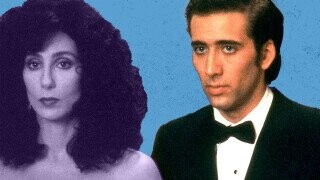The Purity of Funny, Crazy Nic Cage in ‘Moonstruck’

Nicolas Cage has obviously done a lot over the course of his long career — he's stolen the Declaration of Independence, battled chainsaw-wielding cultists and done copious amounts of cocaine before threatening an old lady, just to name a few of his fictional escapades.
We all have our favorite iteration of Cage — some of you will even go to bat for “Screaming About Bees in The Wicker Man Cage” — but I’d like to say a few words about what is arguably the best Nic Cage performance of all-time: his work as Ronny Cammareri in 1987’s Moonstruck, which came out 35 years ago today.
In Cage’s filmography, Moonstruck is sandwiched between Vampire’s Kiss and Raising Arizona, and it seems pretty clear in retrospect that the guy was firing on all comic cylinders at this point. But what makes Moonstruck such a definitive work of pure Cage-iness is how it combines so many of Cage’s wildly disparate modes into one unified character.
Don't Miss
Cage’s Ronny is, on the one hand — pun unavoidable — completely unhinged, but beautifully soulful, too. He’s a character straight out of a classic opera, stuffed into a sweaty Brooklyn basement.
When we first meet Ronny, he’s introduced to his brother Johnny’s girlfriend, Loretta (Cher). He immediately launches into an impassioned monologue about how Johnny ruined his life, blaming him for the accident that cost Ronny his hand, which has memorably been replaced by a wooden one. He then barks at one of the workers in his bakery to bring him the “big knife” so he can cut his throat. Keep in mind that this movie is a rom-com.
On paper, “rage-filled baker with a wooden hand” sounds like the kind of goofy role full of winking self-awareness that Cage could do in his sleep today. After all, his parts have gotten increasingly self-referential in recent years, to the point that Cage is making movies where he literally plays Nicolas Cage. The only way the guy’s career could get any more meta is if he plans to burst through the movie screen, Last Action Hero-style.
But there’s no winking at the camera in Moonstruck; young Cage plays the role of Ronny with complete unblinking earnestness. At the same time, Cage isn’t just playing a shouting weirdo; he’s also the story’s romantic lead and is called upon to be as equally suave and handsome as he is eccentric.
This isn’t to diminish Cher’s contribution here. She won an Oscar for her role, and it surely doesn’t get any better than “Snap out of it!”
But this duality is what came to define Cage’s career; he’s Ghost Rider, but he’s also the star of City of Angels. The same guy who starred in the heartbreaking Leaving Las Vegas was also chewing scenery like a madman in Face/Off. Of course, Moonstruck isn’t the only movie to balance Cage’s passionate, romantic side with his gonzo, extroverted one (see also: Wild at Heart). Still, it’s the most cohesive, and it arguably set the stage for Cage to become an actor who could consistently play both “disquietingly unhinged” and “innately loveable.”
Nic Cage, the romantic leading man, became a more rarified persona as the years passed, and even in relationship-driven dramedies, this particular acting mode became arguably less convincing. Take the Christmas fantasy The Family Man: At times, he can tap into that good-hearted earnestness; at others, it feels like he just made a pit stop at Charlie Sheen’s medicine cabinet. And the two sides don’t always gel.
Moonstruck succeeds for a multitude of reasons — in addition to the two leads, it features greats like Olympia Dukakis and Danny Aiello, was directed by the legendary Norman Jewison and was written by acclaimed playwright John Patrick Shanley.
But Cage did bring a lot to the table in terms of influencing the movie’s tone. He wasn’t Jewison’s first choice for the role (he thought the 23-year-old was “too young”), and Cage only secured the gig thanks to the support of Cher. According to Jewison, Cage had “a darker interpretation of Ronny than I did.” He reportedly “patterned his character’s melodramatic gestures on German Expressionist cinema,” such as the silent sci-fi epic Metropolis.
Which, come to think of it, explains a lot.
You (yes, you) should follow JM on Twitter (if it still exists by the time you’re reading this).